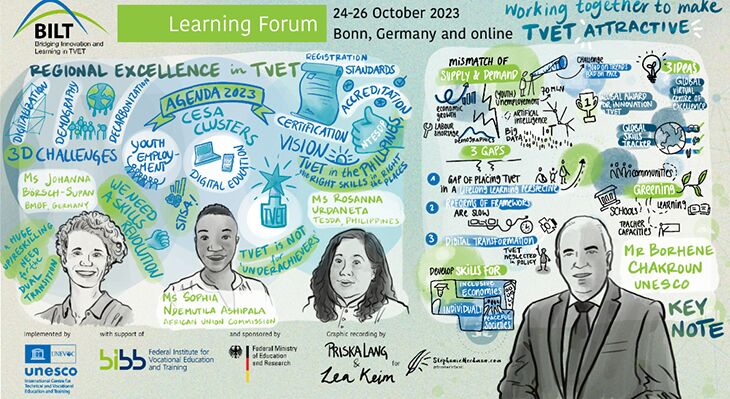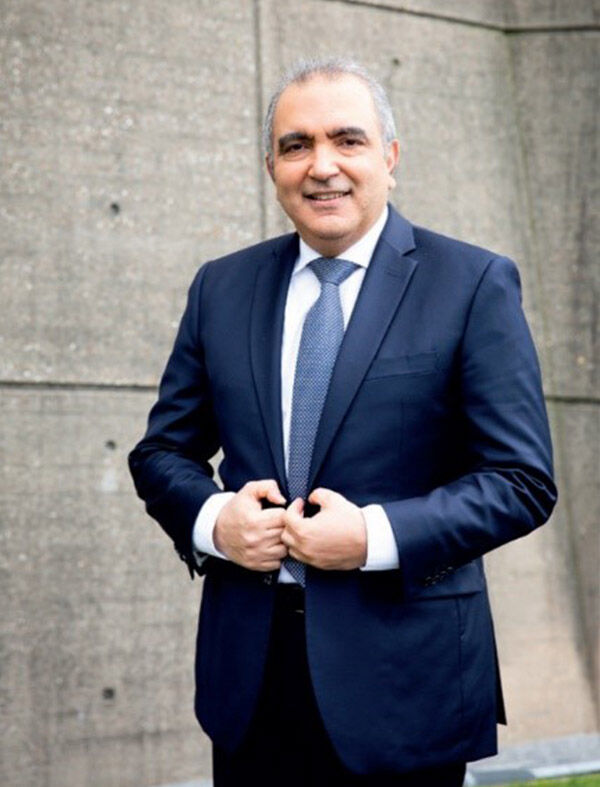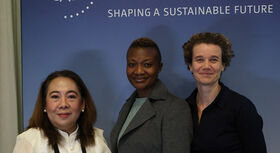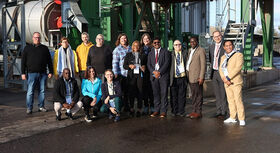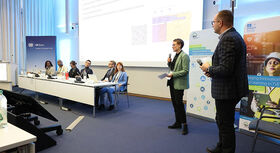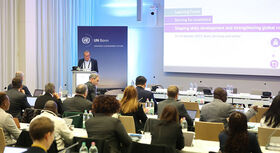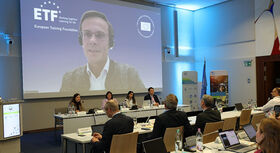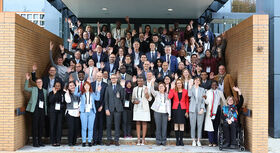BILT Learning Forum 2023 in Bonn
The German Federal Institute for Vocational Education and Training (BIBB) and the UNESCO International Centre for Vocational Education and Training (UNESCO-UNEVOC) hosted the BILT Learning Forum at the United Nations Campus in Bonn 24-26 October 2023. Around 100 vocational education and training experts from Africa, Asia-Pacific and Europe took part in the event on-site with nearly an additional 400 participants online.
The BILT Learning Forum Striving for excellence: Shaping skills development and strengthening global collaboration in TVET was the final crowing event following a series of regional events, Europe (Finland, June 2022), Africa (Kenya, November 2022) and Asia-Pacific (Singapore, June 2023). The Bridging Innovation and Learning in TVET (BILT) initiative is funded by the Federal Ministry of Education and Research (BMBF) and jointly implemented by UNESCO-UNEVOC and BIBB.
Three days - three regions – a multitude of interactions
The overall aim of the event was to present the results of the last two years, to encourage further exchange between the BILT regions of Africa, Asia-Pacific and Europe and to look ahead to the next two years together. A meeting of the high-ranking members from the BILT Advisory Committee also provided an opportunity to discuss strategic points of contact for BILT in the regions and the future direction of the BILT Initiative in a closed circle.
Three days - three focus areas
Everything comes in three! Over the three-day period, the BILT Learning Forum focused on three main topics: strategies for excellence at a political level, expert-based international cooperation in vocational education and training, and the transformative nature of innovation in vocational education and training.
Global strategies for excellence in vocational education and training
Two of the keynotes at the BILT Learning Forum dealt with current TVET policies to promote the acquisition of skills relevant to the labour market.
Dr. Borhene Chakroun, Head of the Division of Lifelong Learning Policies and Systems at UNESCO, provided the first keynote on Day 1. With a global level focus, Dr. Chakroun spoke about socially sustainable skills strategies, the data behind labour market and skills trends, and international cooperation between policy, industry and practice. This last part is particularly relevant in order to respond to and anticipate changes in the supply and demand of competencies, skills and qualifications globally.
Koen Nomden, Team Leader “Transparency and Recognition of Skills and Qualifications” in the Skills and Qualifications Unit of the European Commission (Directorate-General for Employment, Social Affairs and Inclusion) opened the second day of the conference. His presentation on the second day of the conference focused on European initiatives to strengthen skills development, particularly in the context of the dual transformation, and drew a link to digital certificates and micro-credentials. The keynote underlined how the BILT Learning Forum is thematically very well anchored in the European Year of Skills.
Taking the conference theme to heart, via the keynote of Dr. Chakroun and lively panel discussions, the conference took a step closer from skills to excellence. Moreover, with contributions from the three BILT regions, the impulse talk session took a look at excellence in technical vocational education and training:
Dr. Johanna Börsch-Supan, Head of Department for General and Vocational Education and Training and Lifelong Learning at the BMBF, represented the European perspective. She also introduced the BMBF's Vocational Education and Training Excellence Initiative into the discussion. Sophia Ashipala from the African Union highlighted the upcoming Year of Education and newly drafted action plans of the African Union, while Rosanna Urdaneta spoke about strategies for quality assurance and the integration of new qualifications and skills in the Philippines as well as priorities for vocational education and training in the ASEAN region. Questions from the audience enlivened the session.
The programme on the first day was rounded off with visits to the Deutsche Post DHL Group, which presented its Certified Go Green Specialist Programme, as well as to the Kameha Grand Hotel and the asphalt and road construction company Widdig in Bornheim. Each site visit provided a unique insight into their individual training practices with a particular focus on sustainability and digitalization.
Technical Vocational Education and Training research and international cooperation
The second day of the conference was jointly opened by Mr. Friedrich Hübler, Head of the UNESCO International Centre for Vocational Education and Training (UNESCO-UNEVOC) and Ms. Birgit Thomann, Head of the "International Vocational Education and Training" Department at BIBB and focused on international TVET cooperation.
An interview with BIBB's Research Director, Prof. Dr. Hubert Ertl, established the link between BIBB's research work, the transformation topics in BILT and the activities in the global network of UNEVOC centers. During the poster session, participants had the opportunity to exchange views on current projects and new resources from the BILT community as they relate to the megatrends of digitalization and sustainability.
Presentation of the results from the BILT Expert Group 2023
One successful approach to international professional exchange is the interregional BILT expert group with a current focus on the hospitality and tourism sector. The leaders of the expert group presented their assessment of trends in the tourism and hospitality sector in the context of digitalization and sustainability. The Swiss Federal Institute for Vocational Education and Training (Switzerland) leads the project, with co-leads from the École d'Hôtellerie et de Tourisme Paul Dubrule (Cambodia) and the Boma International Hospitality College (Kenya). The group provided insight into TVET policy and practice as it relates to the Green and Digital Transformation in Africa, Asia-Pacific and Europe. Moreover, they developed recommendations for additional measures to better align TVET with the new requirements.
In additional to the keynote provided by Koen Nomden, a second keynote address was given by the Minister of Labour, Human Resource Development and Training from Mauritius, Mr. Soodesh Satkam Callichurn. In his speech he took up the topic of the digital and green future in the tourism and hospitality industry.
Vocational training makes a difference!
The third day was opened by Peter Thiele, Head of Division 315 “Continuing Vocational Education and Training; European Vocational Education and Training Area” at the BMBF. He emphasized that excellent TVET "makes a difference" for individuals, for whom it can open up different pathways, may it be to higher TVET or academic education. Additionally, he shed light on the struggles for young people without formal training. Excellence makes a difference in delivery, for example via innovative digital formats, and is evident in the institutions and companies that are active in dual initial and continuing vocational education and training in Germany. In line with the third pillar of the BMBF's Vocational Education and Training Excellence Initiative, Mr. Thiele emphasized that in view of common challenges and parallel developments in the world's regions, an agreement on common points of orientation in international cooperation is a good idea and that regular exchange at global conferences can advance vocational education and training both nationally and globally.
BILT Learning Lab on digital Micro-credentials
The motto of the day “TVET making a difference” was taken up through showcasing an innovative learning practice (ILP) on micro-credentials from Tourism Training Australia during this hybrid BILT Learning Lab. This tourism-sector-related ILP offers a flexible and needs-based training through short certified digital learning units ("micro-credentials"). The solution was developed to deal with an acute shortage of skilled workers after the pandemic slump. Additionally, a special subsequent panel discussion with experts from the three BILT regions took place. This exchange on micro-credentials was supplemented by further perspectives and areas of application for micro-credentials. The audience was also invited to contribute. Further information on the content can be found on the event page of the Learning Lab – please refer also to “Further information”.
Conclusion on the BILT Learning Forum
Three days, three keynotes, poster sessions, site visits, panel discussions, expert results, and so much more! The BILT Learning Forum provided a successful peer and policy learning platform for the TVET community in Africa, Asia-Pacific and Europe. We thank all participants for their contributions! We also welcome any feedback or queries.
All conference materials will be made available on the event website and can be found under “Further Information”.
If you would like to be informed about current developments and upcoming events of the BILT initiative, please subscribe to our newsletter via the registration link under "Further Information".
